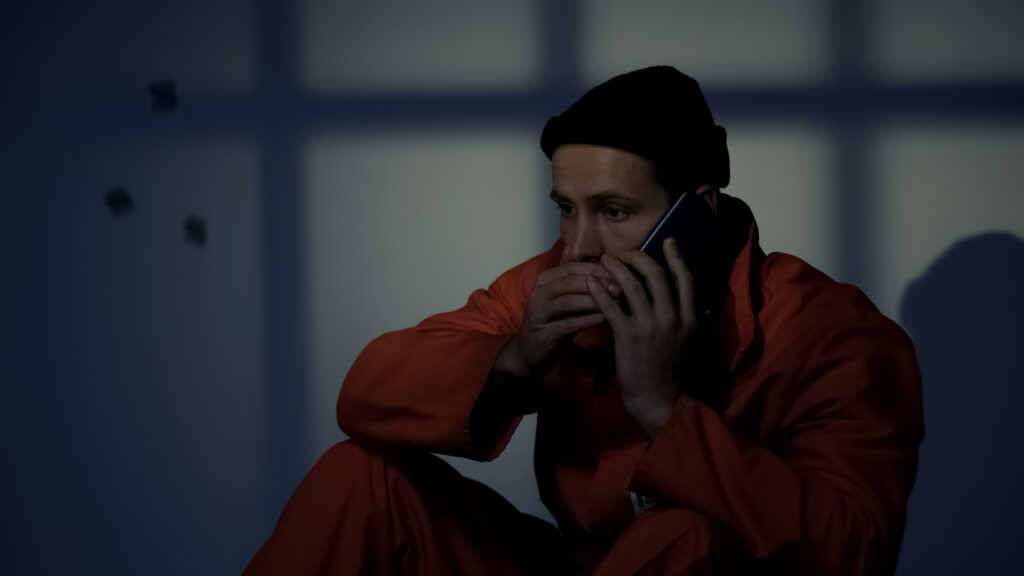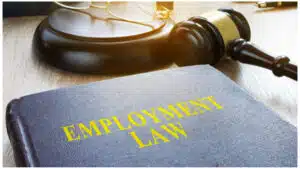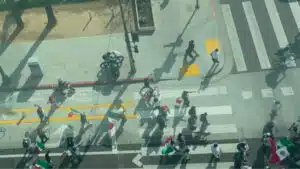Detained? No. Arrested and booked? Yes.
If a person is “detained,” the police officer is holding a person for a short amount of time. If a reasonable person would not feel free to leave, or police prevent a person they are questioning from leaving, that detention turns into an arrest. Police take arrestees to a local jail precinct, where they are then booked. In either scenario, the Fifth Amendment right to remain silent applies and should be invoked.
After a person is arrested and booked, they are entitled to phone calls. California Penal Code Section 851.5 provides that arrestees are entitled to three phone calls immediately upon booking except where physically impossible, and no later than three hours after arrest. Arrestees are entitled to make at least three phone calls at no expense if they are within the local calling area and at the arrested person’s own expense (if outside the local calling area). Local calling areas do not necessarily refer to anything within the same area code as the jail. A sign posted near the telephone booth will provide information about what phone numbers are considered local. Collect calling is also an option for making phone calls to a number outside of the local area. Arrestees may call an attorney, a bail bondsman, or any friend or relative.
If the arrestee is a parent with custodial responsibility for a child, then the arrestee has the right to two additional phone calls for the purpose of arranging for the care of a minor child or children during the arrested person’s absence. These phone calls must also be given immediately upon request, or as soon as practicable.
The right to post-booking phone calls is protected by the Fourteenth Amendment of the U.S. Constitution because California Penal Code Section 851.5 creates a liberty interest. Denying arrestees the opportunity to make a telephone call is a civil rights violation. The Fourteenth Amendment guarantees the right to due process, and is particularly protective of the minimal liberty interests granted to prisoners, such as the ability to make a phone call when arrested and booked.
However, this right to phone calls is not without complications.
First, assume that the police will record any phone call made from jail. These phone calls are not private and may be used against you. Police routinely record the outgoing portion of the phone call, so long as that phone call is not with an attorney.
Additionally, know that in practice, police officers have ways to deny phone calls. Here is one trick: A police officer denies an arrestee their constitutional right to a phone call, then entice with the opportunity to sit the arrested person in a waiting room with a television, instead of a holding cell with concrete and metal benches. The catch to get in the waiting room, which has cushioned chairs and a television, instead of the holding cell?: Sign a statement that says the police provided the opportunity to make three phone calls within three hours of booking. If an arrested person asks for clarification since the police did not, in fact, provide the opportunity to make three phone calls, the arrestees returns to the holding cell instead of the waiting room. After several hours, a cushioned chair and a television look better than a metal bench, concrete floor and a toilet within public view of anyone walking through the area.
If the police denies arrestees their constitutionally protected right to phone calls from jail, then there may be a civil cause of action against the police officers. Police officers are not entitled to qualified immunity for this civil rights violation. Qualified immunity purportedly balances the interests in the vindication of citizens’ constitutional rights and in public officials’ effective performance of their duties. The goal is to make it possible for officials to reasonably anticipate when their conduct may give rise to liability for damages.
But qualified immunity does not immunize police officers where the civil right is so clearly established under law that no reasonable officer could have believed that they were not violating a constitutional right.
The right to phone calls after booking is such a right because the statute establishes that police officers do not have discretion to decline phone calls to arrestees, and the consequences for not allowing someone the ability to call family members or an attorney and let them know where they are can be dire.










